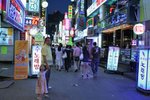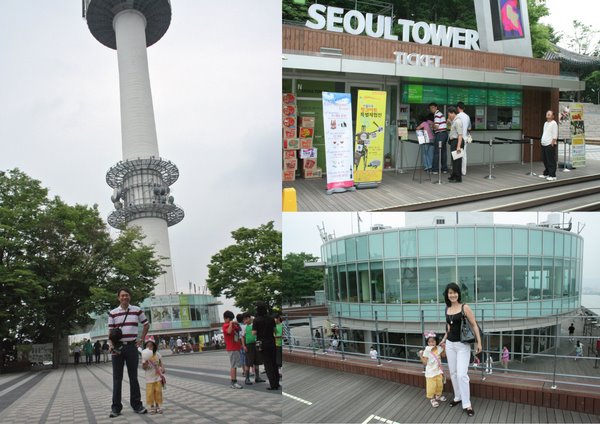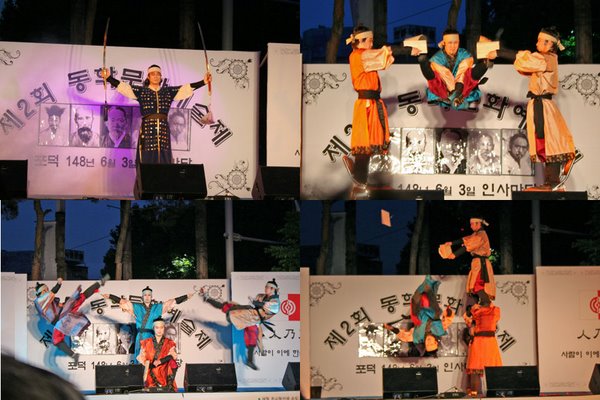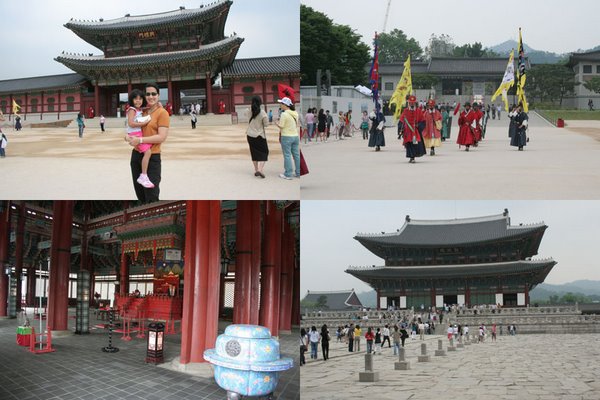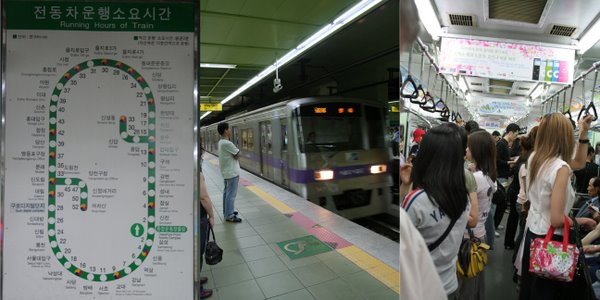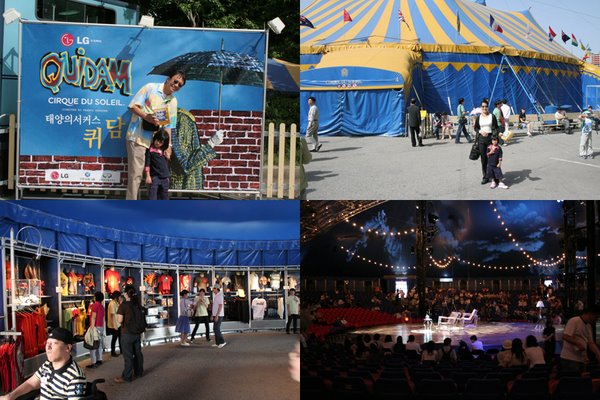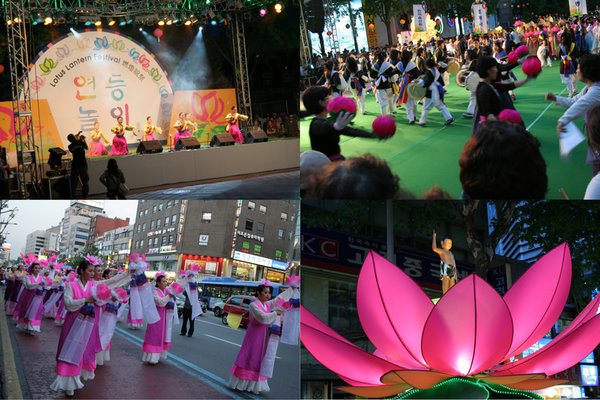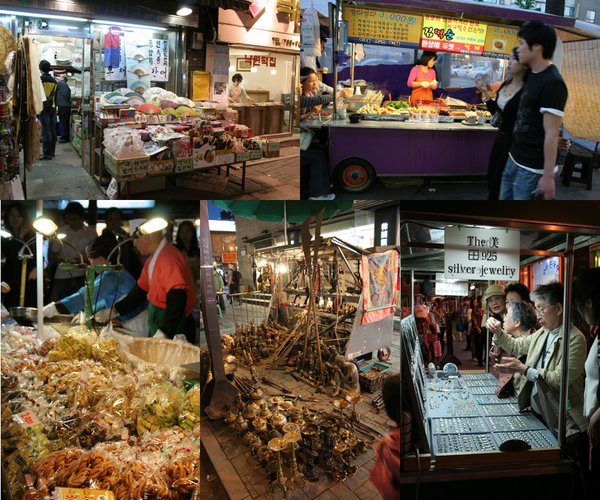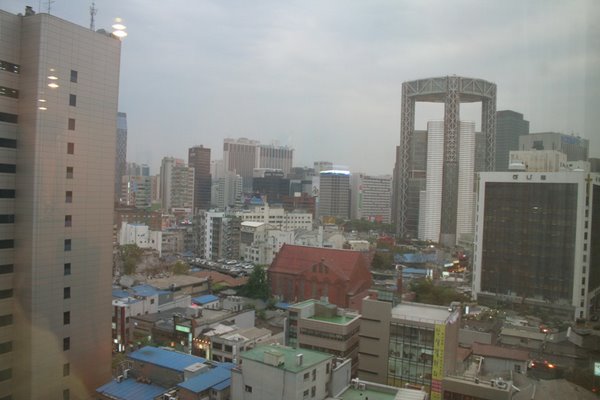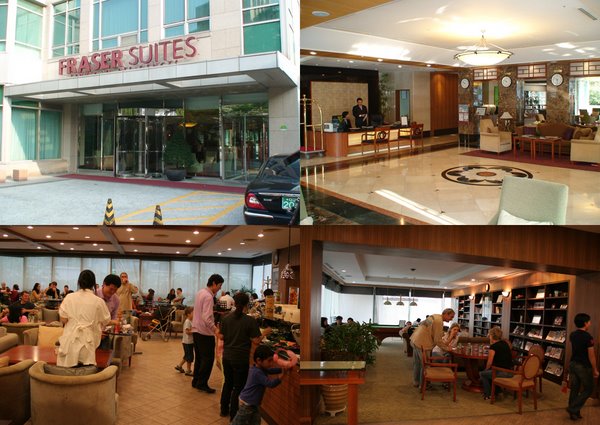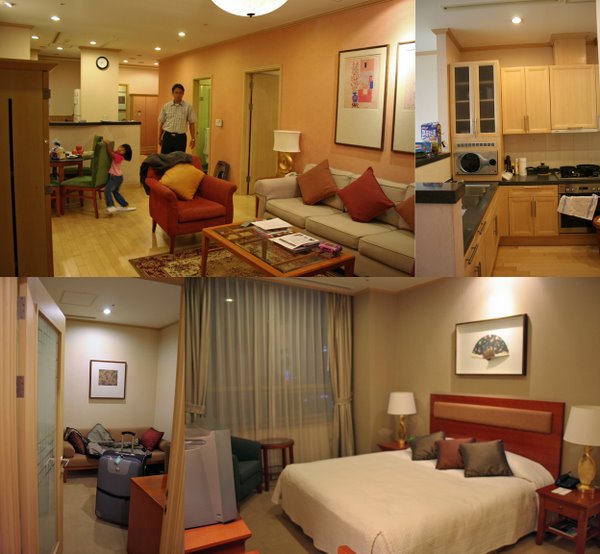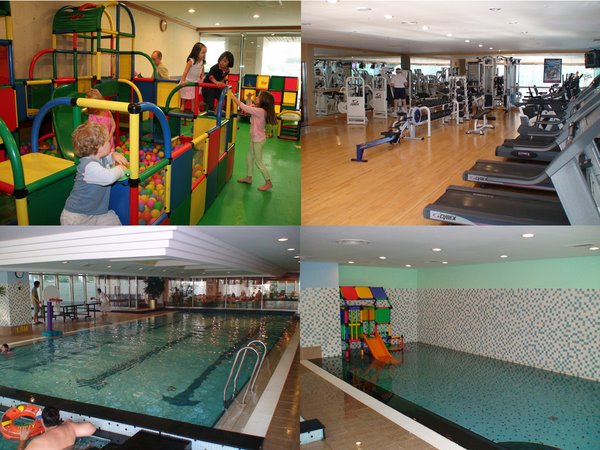25 June 2007
After more than a month in Seoul , I finally needed a haircut. Unfortunately, this was easier said than done.
One thing you will notice as you travel around the city is there is a barber pole sign at almost every street corner. However, this does not necessarily represent a barber shop. It could also mean a massage parlor, a Turkish bath, or an establishment which strictly services male clientele. In fact, much earlier, while I was looking for a place to have my hair cut, I happened to enter one of these facilities. It was located at the basement (one of the signs it more likely is not a barber shop) of one of these regular looking buildings But upon going down the stairs and opening the door, I noticed only cots and not a single barber chair whatsoever. A woman, who was lying on one of the cots, immediately approached me. But before she even said a word, I immediately retreated out of the door.
A local Korean told me that the government years ago warned these establishments to ensure that they had a barber on the staff. Hence, a majority can perform barber services, albeit not that good, but there will always be the offer of "extra" service. You see, prostitution is illegal in Korea. However, because of the large American military facility in the country and of the masculine tendencies inherent in the local culture, this profession is a very much alive and flourishing. In fact, there is a fear that whenever the Korean police authorities decide to crack down on the "red light districts", the women simply go underground by transferring to the "barber shops".
Fortunately, my colleagues in the office suggested that I try the BLUE CLUB. It so happened there was a branch across our office, and so they directed me towards it. This had the usual barber pole but instead of the red, white, and blue colors, it was only white and blue. Upon entering, I was relieved to see a number of barber's chairs and a couple of guys actually having their hair cut. Although my barber could not talk in English, she was able to show me pictures of different styles of haircuts. Upon finishing, she did not tidy me up, so initially, I wasn't that satisfied when I checked myself in the mirror. But upon arriving at the apartment, my wife commented that she liked my trim. I looked at the mirror in our bathroom and she was right! I paid KW 6000 for a regular haircut which also allows you to wash your hair after the haircut is done. This was a first for me because that kind of self service is not offered in Manila. When I informed two locals that I had used this particular barber, they immediatly commented that this was cheap; because other similar establishments would charge around two to three times. Regardless, I will be going back. Next time, however, I will ask them to include a shampoo.
Sunday, June 24, 2007
Sunday, June 17, 2007
Lost in Translation
17 June 2007
After more than a month in Seoul, I can sympathize with the character played by Bill Murray in the movie "Lost in Translation". Korea is quite similar in that minority of the locals can speak English and just a few are fluent in it. Most of the signs are in Korean and only one local channel is in English, "Arirang". It's good there are English newspapers, otherwise, we would not be updated on the local news.
What is surprising is that even in establishments frequented by foreigners, most of the staff cannot speak English. Just take our service apartment, for example. More than 90% of the guests are foreigners but you have to address all your concerns to the front desk because the housekeeping personnel will not be able to understand you. For shopping, the only way we can communicate is when the sales clerk uses a calculator to show the price. In restaurants, including foreign franchised food chains, we have to point to the item on the menu (pictures are preferred) just to specify what we wish to order. Whenever, we go on a trip in the city, we have to review the map or ask directions beforehand; because if you get lost, you won't be able to get any help from strangers. This has already happened to us twice and we just went back to our apartment instead.
Now as a foreigner, you should not be taken aback if a Korean you approach and speak to in English brushes you off or simply ignores you. More likely, the person does not understand and just does not want to look ignorant. As a rule, if you need to ask from a stranger, pick someone younger (preferably in the range of 20-30 yrs old). Aside from having some education in English, they are eager to practice speaking the language. With regards to profession, all the Korean lawyers I have so far met are fluent in English. It may be that since they work in the corporate sector, their job entails this kind of skill, especially if they have to deal with foreign clients or coordinate with the head office (for multinationals). This, unfortunately, does not apply to doctors. Hence, as a foreigner, one of the first things you look for is the nearest hospital with English speaking doctors.
The Korean government is serious about improving the English competency of the local population. I understand that English is a compulsory subject in primary school and for some universities, the medium of instruction is in English. Unfortunately, I read from an editorial on the local newspaper, the quality of English teachers they have is not satisfactory. A number of them are simply performing the function because he/she is the principal and no one else among the available teachers can do it. On the other hand, some of the foreigners that are teaching are not really qualified (do not possess any degree in Education nor in English) and were simply hired because they showed that they could speak the language; albeit in the wrong grammar. This includes Filipinos who come to Korea using a tourist visa and looking for these kind of jobs; which are in high demand.
It is apparent that Korea may soon end up in the same situation as Japan, whose economy has remained stagnant for the last ten years. National pride of your own language (and alpahabet ) is quite admirable. But globalization forces countries (especially those that are driven by exports) to communicate in a common language, which is currently English. I remember when I first went to Singapore some fifteen years ago and it was the same situation wherein most of the people could not speak English. But the Singaporean government had the foresight to make majority of it's population fluent in English. Now, their economy is still thriving and it is one of the most preferred destinations for investment.
After more than a month in Seoul, I can sympathize with the character played by Bill Murray in the movie "Lost in Translation". Korea is quite similar in that minority of the locals can speak English and just a few are fluent in it. Most of the signs are in Korean and only one local channel is in English, "Arirang". It's good there are English newspapers, otherwise, we would not be updated on the local news.
What is surprising is that even in establishments frequented by foreigners, most of the staff cannot speak English. Just take our service apartment, for example. More than 90% of the guests are foreigners but you have to address all your concerns to the front desk because the housekeeping personnel will not be able to understand you. For shopping, the only way we can communicate is when the sales clerk uses a calculator to show the price. In restaurants, including foreign franchised food chains, we have to point to the item on the menu (pictures are preferred) just to specify what we wish to order. Whenever, we go on a trip in the city, we have to review the map or ask directions beforehand; because if you get lost, you won't be able to get any help from strangers. This has already happened to us twice and we just went back to our apartment instead.
Now as a foreigner, you should not be taken aback if a Korean you approach and speak to in English brushes you off or simply ignores you. More likely, the person does not understand and just does not want to look ignorant. As a rule, if you need to ask from a stranger, pick someone younger (preferably in the range of 20-30 yrs old). Aside from having some education in English, they are eager to practice speaking the language. With regards to profession, all the Korean lawyers I have so far met are fluent in English. It may be that since they work in the corporate sector, their job entails this kind of skill, especially if they have to deal with foreign clients or coordinate with the head office (for multinationals). This, unfortunately, does not apply to doctors. Hence, as a foreigner, one of the first things you look for is the nearest hospital with English speaking doctors.
The Korean government is serious about improving the English competency of the local population. I understand that English is a compulsory subject in primary school and for some universities, the medium of instruction is in English. Unfortunately, I read from an editorial on the local newspaper, the quality of English teachers they have is not satisfactory. A number of them are simply performing the function because he/she is the principal and no one else among the available teachers can do it. On the other hand, some of the foreigners that are teaching are not really qualified (do not possess any degree in Education nor in English) and were simply hired because they showed that they could speak the language; albeit in the wrong grammar. This includes Filipinos who come to Korea using a tourist visa and looking for these kind of jobs; which are in high demand.
It is apparent that Korea may soon end up in the same situation as Japan, whose economy has remained stagnant for the last ten years. National pride of your own language (and alpahabet ) is quite admirable. But globalization forces countries (especially those that are driven by exports) to communicate in a common language, which is currently English. I remember when I first went to Singapore some fifteen years ago and it was the same situation wherein most of the people could not speak English. But the Singaporean government had the foresight to make majority of it's population fluent in English. Now, their economy is still thriving and it is one of the most preferred destinations for investment.
Subscribe to:
Comments (Atom)


